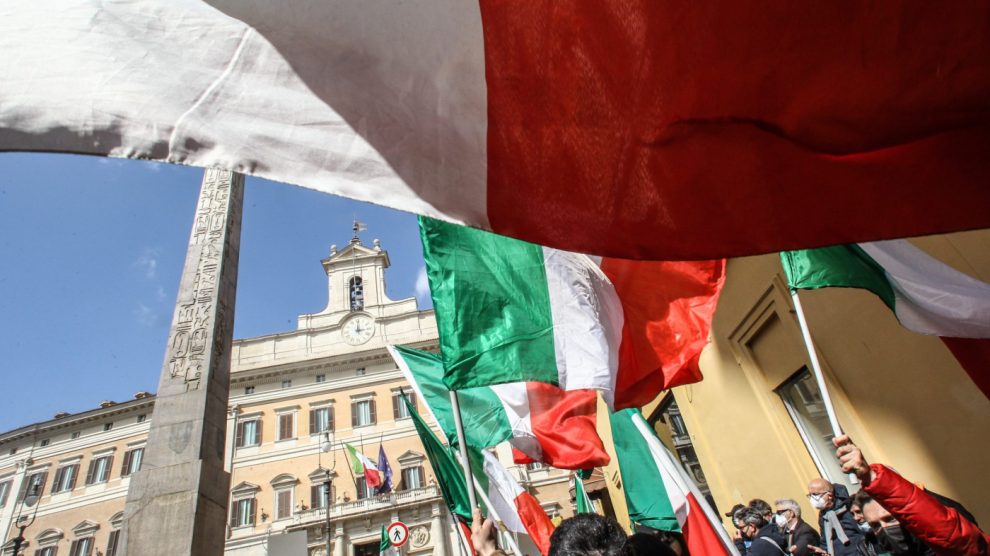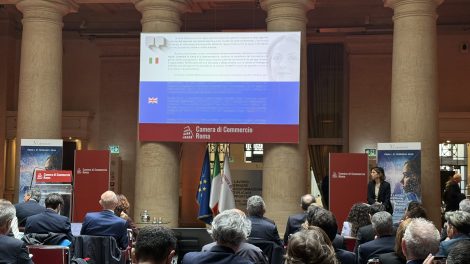Watch out for disinfo heading into EU2024. With the European elections nine months away and the electoral campaign slowly kicking off, foreign disinformation remains one of the key challenges to tackle with the greatest urgency. That’s especially true for Italy, which in the past has shown itself to be vulnerable to the influences of actors such as Russia and China.
- These issues were explored in a policy brief from the European Council on Foreign Relations, titled “Democratic defence: How Italy can lead the fight against Russian disinformation”…
- … and the brief provided the basis for a panel, held at the Italian Senate on Wednesday, to discuss Italy, Europe and Russian and Chinese disinformation and the challenges and prospects in view of the 2024 elections. Decode39 was there: here are some takeaways.
The name of the game. The session was opened by its host, Senator Giuliomaria Terzi di Sant’Agata (President of the Senate’s Commission for European Union Policies), who kicked off the panel by highlighting the perils posed by disinformation “to the transparency and freedom” of people’s consciences, and thus the democratic system via their vote.
- The menace is perhaps “more dangerous than the brute force we see expressed in Russia’s attack – not devoid of genocidal connotations – in Ukraine,” he remarked. And the use of propagation of false narratives, boosted by the use of new technologies, constitutes a direct violation of international law (as is the case with economic coercion and other foreign influence instruments).
- 2024 will be an especially delicate year because over 2 billion people worldwide – in the EU and the US, as well as India, Mexico and Taiwan – are called to vote. That provides fertile ground for disinformation and economic coercion, stressed Senator Terzi.
- He concluded by reiterating the commitment of his own party (Brothers of Italy) to the principle of “knowing to deliberate” and safeguarding information spaces from malignant actors, in line with the G-7, Atlantic and international partners.
Italy as an observatory. In its policy brief, ECFR’s authors gauged the hybrid threat of disinformation by analysing social media data across the Italian infosphere in the period between the fall of the Draghi government and the ensuing elections, August through September 2022. The data shows a spike of coordinated inauthentic behaviour (one of the hallmarks of State-run influence operations) and a very small group of newly-created accounts that managed to mobilise one-third of the debate around elections, pointed out Arturo Varvelli, head of ECFR’s Rome office, who urged wider institutional responses and public awareness to address what he called a “cognitive war.”
- Teresa Coratella, Programme Manager at ECFR Rome and one of the brief’s authors, expanded upon the European scope of the phenomenon – as exemplified by the EU Commission’s reports on social media propagation of Russia’s disinformation in the first year of its full-scale invasion of Ukraine.
- Nonetheless, Italy is a well-placed case study, especially for its past political openness to Russia and China – which was on full display as late as 2020, remarked Ms Coratella, and provided fertile ground for influence operations (ranging from military convoys to mask diplomacy) in the early days of the Covid pandemic.
The nitty gritty. Our own Gabriele Carrer, who co-authored the brief in his capacity as ECFR Visiting Fellow, detailed its core findings. The data consisted of over 5 million public comments across digital media (social platforms, media sites, blogs and online communities) gathered in the period leading up to the Italian elections. It showed over 235,000 unique users generating high levels of engagement and fuelling a highly polarising debate, which is unusual in European infospheres. Among them, only 1.2% acted anomalously – posting at all hours in a seemingly automatised way – and generated 33% of the discussion.
- The narratives were also unusual compared to other recent elections (Italy’s in 2018 and the EU’s in 2019), with energy-related content taking up 34% of the debate, Ukraine amounting to 33%, sanctions on Russia 14%, Covid vaccines 10%, European matters 5% and migration 3%. The prominence of Kremlin-pushed messaging showcases how its propaganda seeped into the Italian infosphere in an attempt to promote Russian interests.
The Russian disinfo playbook. The last speaker was Mattia Caniglia, Associate Director at the Atlantic Council’s Digital Forensic Research Lab, who noted that Russian campaigns have been increasing in sophistication – moving from brash, overt messaging to more agile ones that build upon each other and are often coupled with cyber attacks to augment the damage (such as with Ukraine’s power infrastructure) or obtain more material. Propagandists are also getting more adept at exploiting the windows of opportunities in foreign public debates and news cycles to orchestrate tailor-made operations. For instance, narratives against arming Ukraine in Italy were generic, while they specifically targeted Caesar cannons in France.
- Russian operations have now become both multi-layered – across social media, messaging apps, sites and blogs, traditional media, and even official channels, leveraging cross-contamination and mutual reinforcement – and multistep, as they circulate briefly and then re-emerge at the most opportune time in support of other campaigns. For example, narratives about Ukrainians selling NATO weapons to third countries first emerged in the Balkans and Eastern Europe, only to then re-emerge in Italy, France and Spain.
- Finally, the Kremlin employs methods such as false fact-checking and spreading their narratives in different languages to amplify them. For that same reason they also employ foreign “useful idiots” and visible individuals to inject narratives into the news cycle through them.
What about China? Mr Caniglia explained that Beijings’ methods reflect the country’s more strategically-minded culture insofar as they are more cautious, less visible and reactive, geared towards the longer term. Chinese disinformation campaigns hinge on exacerbating divisions within foreign countries (or organisations like NATO) while reinforcing Beijing’s projection and point of view to delegitimise democratic processes and promote the autocratic model.
- Their aim is to influence and shape policies and perceptions to make them more conducive to the Chinese Communist Party’s strategic objectives.
- Their approach is based on the concept of media convergence, i.e. progressive integration between the CCP’s propaganda – a symptom of evolution.





